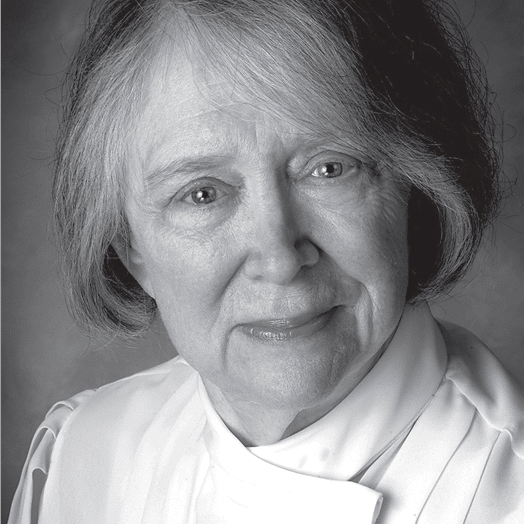Carolyn F. Swift

Share
Carolyn Swift’s vibrant and engaged life enriched her family, friends, and profession. She passed away peacefully on November 9, 2020, and will be buried next to her husband, George W. Swift, at Pioneer Cemetery, Lawrence, Kansas, in a private service.
Carolyn was blessed with a loving family, and recognized and honored for pioneering excellence and leadership in community psychology, prevention and community mental health. Carolyn met her husband George W. (Bill) Swift when they were both undergraduates at the University of Kansas. They settled in Lawrence, Kansas to raise their three children. As Bill pursued a career as professor of Chemical and Petroleum Engineering, Carolyn earned her Ph.D. in clinical psychology from the University of Kansas. Her life path reflected her aim as an early feminist to combine devotion to family with a passion to build a more just world.
The visionary nature of her work is evident from its beginnings in the early 1970s to its ongoing relevance to current social issues, with its aim to combat unjust outcomes for underserved populations. Early on she worked as a psychologist at the Wyandot Mental Health Center in Kansas City, Kansas. There she developed training programs to improve police officer interactions with the public, treatment programs for alcoholics and jailed offenders, and recovery programs to prevent young males from reentering the prison system. In particular, she established a group home where they could attend school, work off their sentences, and have their arrest records expunged. She funded these initiatives with grants awarded from a variety of resources.
In 1976 she helped create and became the first chair of the Council on Prevention of the National Council of Community Mental Health Centers. Under her leadership, the council’s task forces and policies promoted the importance of diversity, recognition of minority mental health needs, and multi-ethnic composition of boards of directors.
In 1979 she moved on to explore a new cutting-edge interactive TV network in Columbus, Ohio (QUBE), as a platform for teaching prosocial behavior to children as a preliminary step in violence prevention, together with a position at Southwest Community Mental Health Center in Columbus, Ohio where she developed a prevention department with a staff of ten.
Continuing to focus on the promotion of community mental health, empowerment, and social justice, she served as Director of the Stone Center for Developmental Services and Studies at Wellesley College, Wellesley, Massachusetts, known for its groundbreaking role in establishing relational cultural theory. from 1983 to 1989. There she developed and oversaw programs to support student mental health and well-being and broader initiatives to promote empowerment of both men and women.
Her contributions to the profession after Wellesley continued through appointments to boards, and service on committees with the American Psychological Association (APA) and the APA’s Division 27 Society for Community Research and Action (SCRA). Her continuing publications on topics ranging from sexual abuse to empowerment remain foundational in these areas.
In 2005 she was elected as SCRA’s Div. 27’s President, where she continued as a role model and beacon of commitment and action on racial and social justice. As she wrote in her inaugural column as President in The Community Psychologist (Fall 2006), “The community psychology of the future will be guided by four principles: global in nature; use of multi-sectoral, interdisciplinary partnerships and approaches; a focus on creating policies informed by community psychology and social justice values; and research and action that promote social justice.” She continued to voice a vision for transformational change in summing up her advice to others in an account of her life’s trajectory, “If you have a passion to change this world into a better one, it’s worth your energy and time to try, it’s worth the risks, it’s worth a lifetime of commitment” (“Odyssey of a Community Psychologist Practitioner,” 2008).
A beloved wife, mother, grandmother, and friend, Carolyn had a passion for life, which she shared with everyone around her. Carolyn’s 56-year marriage ended with Bill’s death in 2008. Her many interests during retirement ranged from serving as a board member of the Albert Bloch Foundation, ardently cheering on the KU basketball team, and travels with family and friends. Carolyn and her rescue dog Tango became a familiar site in the off-campus neighborhood where they walked several times a day. Surviving are her children, Lynn, Mary, and George, and one grandchild, Nick.
In lieu of flowers, memorial contributions may be made in her name to either the Ballard Center or The Wellesley Centers for Women Fund and may be sent in care of Warren-McElwain Mortuary, 120 W. 13th Street, Lawrence, KS 66044.

So many wonderful memories and so much emotion overcame me as I read this about your mother. I realize she’d been ill for quite a while. In fact I saw her in her nursing facility the last time I was in Lawrence six years ago. Nonetheless I’m so terribly sad that she’s gone. Your parents were both very special people to my parents and to me. We were all lucky to have them. My sympathy and love to you all. Jane Albrecht Alix